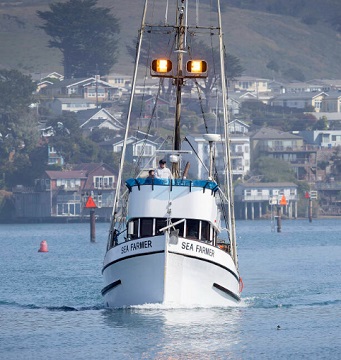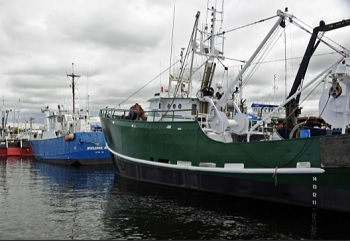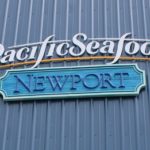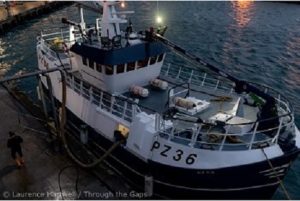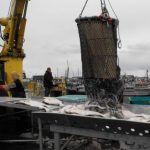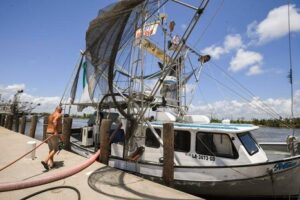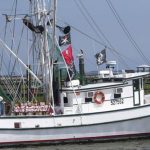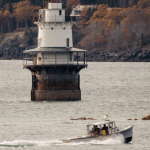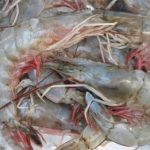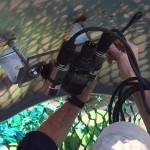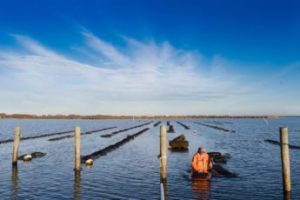U.S. Rep. Jeff Van Drew, D-2nd, joined Alaskan Rep. Don Young, a Republican, to introduce a bill reauthorizing the Magnuson-Stevens Fishery and Conservation Management Act on Thursday. But the bill would make changes to the law that some environmentalists fear may result in taking more fish than is sustainable. Among other things, the reauthorization would change how fishery councils determine fishery stock rebuilding timeframes, giving the public a greater role in the development of science and fishery management plans. In a statement, Van Drew said H.R. 3697 “ensures that we have healthy fisheries, keep anglers in the water and keep fishermen fishing.” >click to read< 09:10
Tag Archives: Oceana
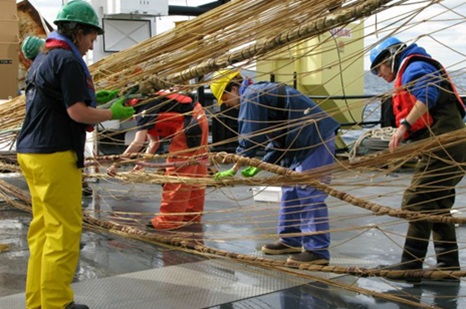
Multiple groups urge seafloor protections from pelagic trawling
A diverse group of harvesters, conservation entities and others are calling on federal fisheries managers to do more to protect seafloor habitats from midwater trawl nets they say are dragging the bottom of the ocean floor. Midwater, or pelagic trawling — used to catch schooling fish like pollock, is supposed to be fished in the water column rather than on the seafloor. For this reason, pelagic trawling is allowed in most conservation areas closed to bottom trawling — a form of fishing where nets are purposely dragged on the seafloor and damage corals, sponges and other living seafloor habitats in the process. An analysis by the National Marine Fisheries Service indicates that 40% to 100% of the width of pelagic trawl gear fished in the Gulf of Alaska and Bering Sea has been in contact with the seafloor, and that these nets, which range from 50 to 190 yards wide, are dragged for miles. more, >>CLICK TO READ<< 20:12
A whale washed up dead. Greens blame a Democrat.
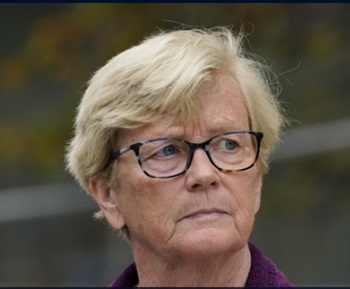 Environmentalists say Chellie Pingree’s defense of the Maine lobster industry could imperil a critically endangered whale. Doing what greens want would likely send the Democrat to political extinction. Conservation advocates are publicly pressuring Pingree to overturn a law that protects Maine’s prized lobster fishery. The calls come after one of only 360 remaining North Atlantic right whales washed up dead in February entangled in Maine lobstering rope. “I think it is a little bit more of a black mark on an otherwise fairly good conservation record,” said Brett Hartl, the government affairs director at the Center for Biological Diversity, on Pingree’s support of the pro-lobstering law. It’s a rare rebuke of a longtime ally who has a near-pristine voting record on environmental issues. Pingree says she has no plans to reverse course, but the incident highlights how lawmakers continue to balance environmental concerns with the everyday lives of their constituents. more, >>CLICK TO READ<< 17:57
Environmentalists say Chellie Pingree’s defense of the Maine lobster industry could imperil a critically endangered whale. Doing what greens want would likely send the Democrat to political extinction. Conservation advocates are publicly pressuring Pingree to overturn a law that protects Maine’s prized lobster fishery. The calls come after one of only 360 remaining North Atlantic right whales washed up dead in February entangled in Maine lobstering rope. “I think it is a little bit more of a black mark on an otherwise fairly good conservation record,” said Brett Hartl, the government affairs director at the Center for Biological Diversity, on Pingree’s support of the pro-lobstering law. It’s a rare rebuke of a longtime ally who has a near-pristine voting record on environmental issues. Pingree says she has no plans to reverse course, but the incident highlights how lawmakers continue to balance environmental concerns with the everyday lives of their constituents. more, >>CLICK TO READ<< 17:57
Will small boats soon have to slow down off NC to protect North Atlantic Right Whales?
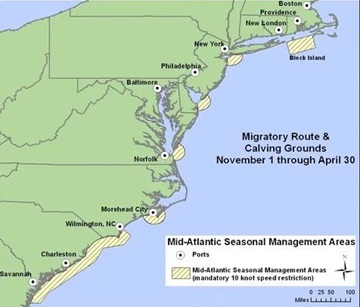 Vessel speed limits to help avoid fatal collisions between ships and one of the most endangered animals in the world that has fallen to around 350 individuals have gone back into effect off the U.S. Southeastern coast, including parts of North Carolina. The seasonal-management areas, or SMAs, limit the speed of most vessels 65 feet or longer to 10 knots, about 11.5 mph, in areas known to have heavy ship traffic that are also migratory routes or known calving grounds for the North Atlantic right whale. The go-slow zones, which run from November through April and have been in effect for more than a decade, extend about 20 nautical miles, or 23 miles, offshore and include areas around Morehead City and Beaufort and within 23 miles from shore between Wilmington and Brunswick, Ga. >>click to read<< 15:46
Vessel speed limits to help avoid fatal collisions between ships and one of the most endangered animals in the world that has fallen to around 350 individuals have gone back into effect off the U.S. Southeastern coast, including parts of North Carolina. The seasonal-management areas, or SMAs, limit the speed of most vessels 65 feet or longer to 10 knots, about 11.5 mph, in areas known to have heavy ship traffic that are also migratory routes or known calving grounds for the North Atlantic right whale. The go-slow zones, which run from November through April and have been in effect for more than a decade, extend about 20 nautical miles, or 23 miles, offshore and include areas around Morehead City and Beaufort and within 23 miles from shore between Wilmington and Brunswick, Ga. >>click to read<< 15:46
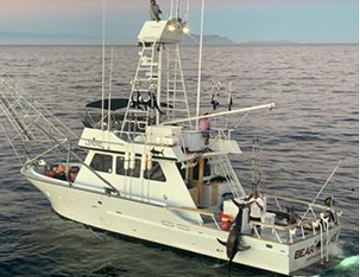
First permits issued for swordfish captains in California
The first commercial fishing permits for the use of deep-set buoy gear in the swordfish fishery in the US state of California were issued by the National Marine Fisheries Service on September 15, marking a significant transition from the large nets that drifted off the West Coast. Gillnets will finally disappear by 2027, replaced mostly by deep-set buoy gear — vertical lines about 150 fathoms long, with a flagpole with a light or radar reflector on top and a bug- and sinker to keep the line anchored vertically. Main lines usually have one to three round hooks with a light attached to shine below the thermocline in 20 to 70 meters (65 to 230 feet) of California water. The gear is designed to be actively maintained, with strike indicators on the surface to alert anglers when a fish is present. >>click to read << 16:23

Canada, U.S., Mexico to vote on investigation into U.S. efforts to protect right whales
A complaint, filed under the new North American free trade agreement, will force Canada, the U.S., and Mexico to pass judgment on efforts by the United States to protect North Atlantic right whales. “We recommended an independent investigation. We are looking forward to hearing a response and the position from the governments,” Paolo Solano, legal director for the Commission for Environmental Cooperation, said in Halifax this week. The commission is mandated under the Canada-U.S.-Mexico Agreement (CUSMA) to investigate claims a country is failing to effectively enforce its environmental laws. Last year, an American environmental group, Oceana, filed a complaint against the United States about protections for the North Atlantic right whale. >click to read< 07:51
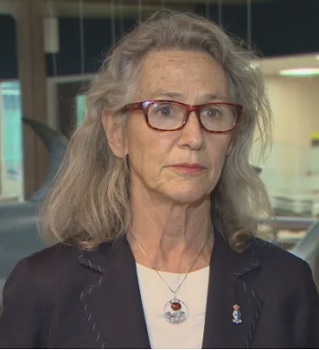
Canada proposes 62 fish stocks for sustainability protection
The Department of Fisheries and Oceans has proposed adding 62 stocks to a regulatory list that binds the minister to rebuild them if they become depleted. In April the first batch of 30 was added. On Oct. 19 the department released a second batch of 62 stocks for public consultation. Comments close Dec. 19. Most stocks in the second batch are considered healthy, but candidates also include three stocks in trouble: cod and herring off southern Nova Scotia and yellowtail flounder in the Gulf of St Lawrence. Speaking to an Oceana conference on restoring fish populations in Ottawa last week Fisheries Minister Joyce Murray pledged to work toward that goal. >click to read< 10:07
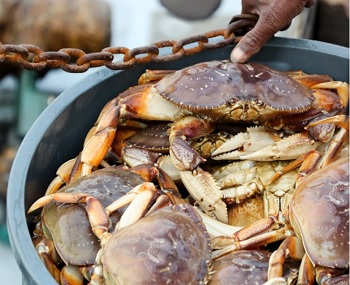
California officials delay the start of 2022 Dungeness season
The season was scheduled to start Nov. 15 in the waters from the Sonoma/Mendocino County line south to the Mexican border. The order came down Friday evening from Charlton H. Bonham, director of the California Department of Fish and Wildlife. “Based on recent surveys, large aggregations of humpback whales continue to forage in California coastal waters and allowing the use of crab traps would increase the risk of an entanglement,” Bonham said in announcing the decision. >click to read< 11:34

ENGO recommends against consuming lobster over danger to whales
Seafood Watch, a program out of the Monterey Bay Aquarium, says entanglement in fishing gear is the leading cause of death of the critically endangered North Atlantic right whale population, and US and Canadian lobster fisheries aren’t doing enough to prevent it. Jennifer Dianto Kemmerly is vice president of global ocean conservation at the Aquarium. “We really want consumers and businesses to be aware of how dire the situation is,” Kemmerly said. Meanwhile, the international conservation group Oceana blamed the National Marine Fisheries Service for failing to update safeguards that would protect both right whales and lobster fisheries. To remove the red listing, it recommends using ropeless gear, expanding seasonal closures where whales are present, and improving transparency and monitoring of fishing vessels. >click to read< 18:11

DFO enacts new regulations aimed at depleted fish stocks
The Department of Fisheries and Oceans has enacted new regulations that bind its minister to rebuilding Canada’s depleted fish stocks and ensuring healthy ones stay that way, a move that comes weeks after it closed down two East Coast fisheries in the name of sustainability. The regulations are the teeth behind amendments to the Fisheries Act passed in 2019 and have been closely watched by the commercial fishing industry and environmentalists. The changes were posted Wednesday in the Canada Gazette. It identified 30 major fish stocks that will require a rebuilding plan,,, The minister for the department will have up to three years to produce a rebuilding plan once the stock has hit the limit reference point. >click to read< 16:32
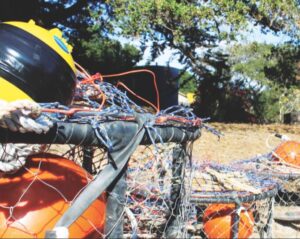
Dungeness Crab Season Could be Delayed Again this Year – The push for pop-up gear systems
This year, according to NMFS data, there have been 16 confirmed whale entanglements along the West Coast through Sept. 30. That includes 10 humpback whales, four gray whales, one fin whale and a minke whale; 11 other reports could not be verified. The vast majority of these reports came from waters along California. The California Dungeness Crab Fishing Gear Working Group, known informally as the Whale Working Group, was created in September 2015 and is made up of industry players, government officials and environmentalists looking for solutions. >click to read< 09:53

Can American lobstermen survive new restrictions, ESA listing of the North Atlantic Right Whale?
For centuries, North Atlantic right whales were aggressively hunted for their meat and their oil, which was used to keep lamps lit and to make soap.,, Since 2017, the National Oceanic and Atmospheric Association (NOAA) has documented 34 dead whales (21 in Canada; 13 in the U.S.), and 16 whales with serious injuries from entanglements or vessel strikes. In an attempt to conserve and rebuild the population, NOAA announced new regulations in August 2021 on the Maine lobster and Jonah crab industries, including the closure of large parts of the Gulf of Maine to lobstering between October and January and requiring more traps per trawl to reduce the overall number of lines in the water. >click to read< By A.N. Smith 13:15
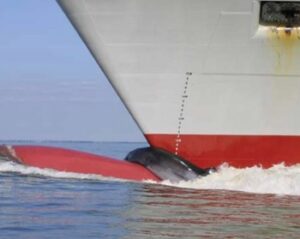
Cargo vessels endanger North Atlantic right whales off Port of Savannah
Cargo vessels operating off the increasingly busy Port of Savannah are the primary violators of speed limits intended to protect the critically endangered right whales,,, The report comes as North American Right Whales again experience a declining population. NOAA lastest report on conservation efforts, issued December 2020, cites two leading causes of injuries and death as: A vessel strike, meaning the whales’ bodies may be sliced or chopped by ships’ propellers; and getting tangled in fishing gear,,, Canada has joined the U.S. in issuing rules intended to protect right whales from ship collisions. >click to read< 08:41
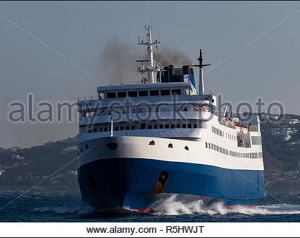
Analyzing NOAA data confirms that speeding ships are killing endangered North Atlantic right whales
Most vessels are exceeding speed limits in areas designated to protect critically endangered North Atlantic right whales,,, The non-profit organization Oceana analyzed ship and boat speeds from 2017 to 2020 in speed zones established by the National Oceanic and Atmospheric Administration (NOAA) along the US Atlantic coast. Non-compliance was as high as almost 90 percent in mandatory speed zones, while non-cooperation was as high as almost 85 percent in the voluntary areas,. Collisions with vessels are one of two leading causes of injury and death for North Atlantic right whales, with research showing that slowing vessel speeds to 10 knots (11.5 mph, 18.5 kph) reduces the risk of death by 80 to 90 percent. >click to read< 16:32
With admirable acknowledgment, we recognize Jim O’Connell, and his contribution to the issue of ship strikes – “North Atlantic Right Whale: How to kill a species with Fake News, from National Geographic of all places!“, and “Most likely Carnival Cruise Lines is responsible for 18+ Right Whale deaths in the past 3 year, at which rate they would soon be extinct”.>click to read both<, and other articles from Jim,, >click to read<. Thank you, Jim!

Biological Opinion to Protect Right Whales Met With Opposition on All Sides
The National Marine Fisheries Service (NMFS) released a key report called a Biological Opinion yesterday that calls for a 98 percent reduction in risk to North Atlantic right whales over the next 10 years. The goal is meant to be achieved over the course of four phases that correspond with increasingly tight restrictions on lobster and crab fisheries as well as other fixed-gear fisheries that use vertical buoy ropes. Vertical ropes attached to trap/pot gear is known to lethally entangle the whales. >click to read< 16:38
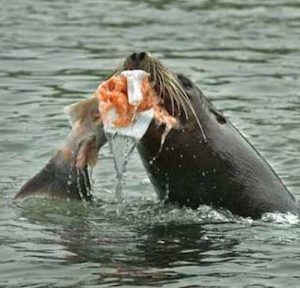
DFO is making new fishing rules. Will they work? (without addressing seal/sea lion over population issues they won’t)
The proposed rules codify pre-existing internal DFO policies and require the ministry to assess the health of key fish populations in “batches”, salmon, rockfish and cod are in the first batch of 30, to figure out why their populations have declined (or could decline) and lay out a plan to bring the stocks back to healthy levels. If the ministry doesn’t comply or opens a threatened fishery, it could be sued. Similar, but more stringent, regulations have been successfully implemented in other jurisdictions with major fisheries, like the U.S. and the EU. >click to read< 07:50
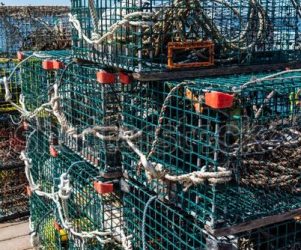
Massachusetts Marine Fisheries Advisory Commission bans inshore lobstering during whale migration
Meeting via webinar, the MFAC overwhelmingly approved five of the six recommendations presented by the state Division of Marine Fisheries, setting the stage for a hectic start to the state’s 2021 lobster fishing season.,, A Feb. 1 to May 15 closure to commercial trap gear in all state waters,, weaker buoy lines,, A Jan. 15 to May 15 gillnet closure in Cape Cod Bay,, All but one of the approved measures passed on unanimous 8-0 votes. The exception was the recommendation for the Feb. 1 to May 15 commercial trap gear closure in all state waters. The lone dissenting vote on the measure came from longtime Gloucester lobsterman Arthur “Sooky” Sawyer, “I can’t support this motion. The Massachusetts inshore lobster fishery has never killed a right whale. I’m voting no.” >click to read< 18:35
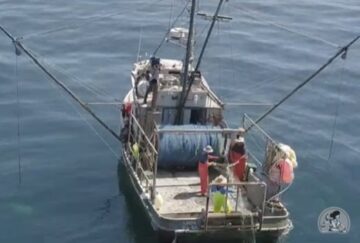
Blue collar fishermen deserve to make a living, not persecution from weak minded politicians and wealthy enviros
Austen Brown started fishing commercially with his father off California’s coast when he was only 8 years old. By the time he was 13, Austen was making his own living as a fisherman, and he has spent the past few decades fishing for everything from codfish to shark. But perhaps his favorite target is the elusive swordfish.,, The swordfish is also a favorite catch for Chris Williams, who has spent more than 40 years plying his commercial fishing trade off the California coast, including targeting swordfish with drift gillnets. Tragically, California’s drift gillnet ban comes at the expense of the fishermen and their families who will be put out of business for no good reason. Video, >click to read< 08:34
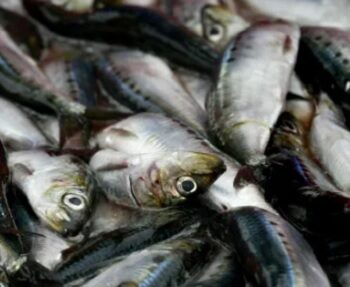
The sardine war hits a lull: Commercial fishing industry lands a victory in Pacific sardine management
The Pacific Fishery Management Council, which oversees fishing of Pacific sardines, voted unanimously in September to maintain the current sardine fishery management process that calls for reassessments after each year’s stock assessments. At the moment, the direct commercial sardine fishery is closed. “Fishery managers have failed to learn from the mistakes of history,” said Geoff Shester, senior scientist at marine conservation group Oceana,,, Diane Pleschner-Steele, executive director of the California Wetfish Producers Association, argues that sardines are not overfished and “the Council’s unanimous decision shows that they understand reality, the big picture.” >click to read< 14:27
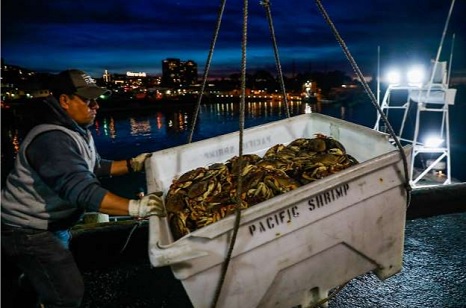
Dungeness crab season might not open for Thanksgiving again
New state regulations may mean that Dungeness crabs won’t be in stores in time for Thanksgiving. The rules, aimed at preventing entanglements “I want to make sure it’s understood what kind of effort we’re putting into it as fishermen and how effective we’ve been,” said Dick Ogg, a Bodega Bay fisherman and a member of the California Dungeness Crab Fishing Gear Working Group that developed the rules. He said that fishermen have worked hard to make sure their gear is set up better to lower risk. “We’ve really reduced our interaction and entanglement rates.” Ogg said there is a lot of anxiety in the fishing fleet about what will happen with the coming season and whether they should start gearing up for a Nov. 15 opening or whether it will be delayed. >click to read< 10:01
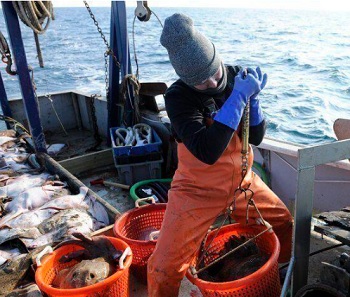
Fishing group asks Baker to fight ‘crippling’ monitor measure
The Northeast Seafood Coalition is trying to enlist Gov. Charlie Baker in its campaign against the monitoring measure that it charges has the “strong potential” to financially cripple the state’s commercial groundfish industry. The Gloucester-based coalition sent Baker a letter last Friday laying out its case that Amendment 23, which will set future monitoring levels for sector-based, Northeast commercial groundfish vessels is highly flawed and should be withdrawn by the New England Fishery Management Council. >click to read< 12:47

Federal judge rules fishery managers failed to prevent overfishing of northern anchovy
A federal judge has ruled that the National Marine Fisheries Service (NMFS) must go back to the drawing board and redo the catch limit for northern anchovy — an important food source for whales, sea lions, brown pelicans, and salmon. Judge Lucy M. Koh ordered the agency to issue a new rule within 120 days that accounts for the drastic fluctuations in anchovy populations and prevents overfishing when the stock is low. >click to read< 09:33
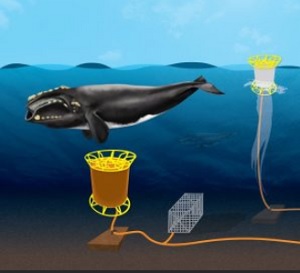
Everything you’ve heard about ‘ropeless’ fishing gear is false.
Is so-called “ropeless” fishing gear the magic bullet for the perceived problem of marine mammal interactions in California’s crab fisheries? (what about the New England lobster fishery?) Several profit-driven environmental groups, including Oceana, would like the public and the California Department of Fish and Wildlife (CDFW) to believe it is.,,, In truth, there have only been four mortalities attributed to CA commercial Dungeness crab gear since 2013, and none during the last two seasons.,,, Maine’s lobster fishery has never had a documented serious injury or mortality for any Right whale, and no entanglement since 2002, which makes this a non-problem. One of the problems with “ropeless” gear is that it’s a misleading term used by the profit-driven environmental groups to make it seem harmless. >click to read< 15:06
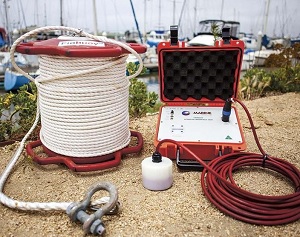
Ropeless gear is not the silver bullet – New technology promises to save the whales by reducing the need for crab fishing lines.
“We are working with fishermen to see what works and what doesn’t and what allows the fisherman to survive economically,” says Geoff Shester, a Monterey-based scientist with nonprofit Ocean. In June, the Ocean Protection Council awarded $500,000 for the testing of pop-up gear in the coming fishing season. The money will pay for five prototypes, including designs by Marina-based Desert Star Systems and Watsonville-based McFarlane Marine Services. The money will also go to fishermen participating in the research. A new crab industry group, California Coast Crab Association, is pushing back. Its president, Ben Platt, described the RAMP regulations as “an existential threat to our livelihoods”,,, >click to read< 08:39
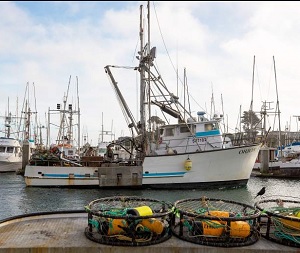
New rules for California Dungeness crab fleet
The California Department of Fish and Wildlife on Friday unveiled a batch of complex new rules designed to reduce the risk to endangered whales and sea turtles of becoming entangled in commercial Dungeness crab fishing gear. The draft regulations are set to be finalized before the next commercial season starts in November after a period of public review. Among the provisions are options to restrict fishing in certain depths, require crabbers to set only a share of the traps for which they’re permitted or limit intervention to any of six newly established geographic zones, rather than the larger Northern and Central California management districts that currently exist. >click to read< 09:14
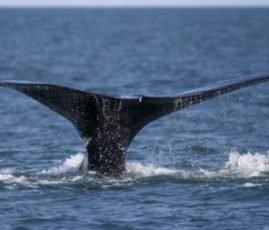
Federal regulations to protect right whales are delayed until at least this summer
Officials at the National Oceanic and Atmospheric Administration, which is responsible for protecting the critically endangered species, had planned to issue the regulations last year. But they were delayed after months of criticism from the region’s powerful lobster industry, which is worried that new requirements could be harsh and expensive. >click to read< 18:03
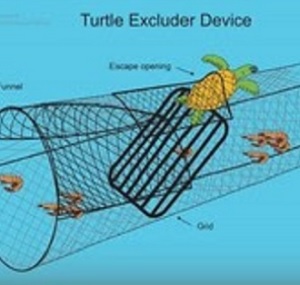
NOAA Issues Final Rule to Require Turtle Excluder Device Use for all Skimmer Trawl Vessels 40 Feet and Greater in Length
NOAA originally published a proposed rule in December 2016 that would have required all skimmer trawl, pusher-head trawl, and wing net vessels to use TEDs in their nets. In response to public comment and further deliberation, however, the final rule was revised. >click to read details<, Meanwhile, the enviro groups Plan to Save Sea Turtles From Shrimp Boats Scaled Way Back – “We’re scratching our heads on why this change happened,” said Gib Brogan, fishery campaign manager for Oceana, which sued to get the devices into inshore shrimp nets in NOAA’s Southeast Region. >click to read< 10:20
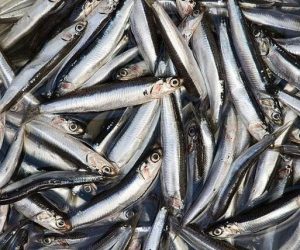
Sides battle over Monterey Bay’s anchovy population
A fishing industry group says it has new findings supporting its contention that there is a healthy population of anchovies, which is counter to a nonprofit’s lawsuit challenging how the number of anchovies are determined. Meanwhile, Monterey fishermen say there are tons of the little guys in the local fishery. Gino Pennisi and Neil Guglielmo have been fishing out of Monterey for years, in Guglielmo’s case, since 1956. Both say anchovies are plentiful. But the nonprofit group Oceana,,, >click to read< 13:07






